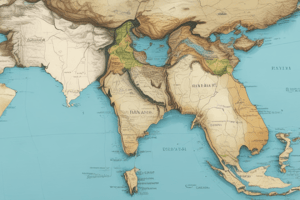Podcast
Questions and Answers
¿Qué son los recursos estratégicos en el contexto de la geopolítica?
¿Qué son los recursos estratégicos en el contexto de la geopolítica?
- Recursos que son importantes para la economía y el poder militar de una nación. (correct)
- Recursos que son esenciales para la cultura de una nación.
- Recursos que están relacionados únicamente con el medio ambiente.
- Recursos que son exclusivamente tecnológicos.
¿Cuál de las siguientes teorías geopolíticas enfatiza la importancia de las regiones costeras y las naciones insulares?
¿Cuál de las siguientes teorías geopolíticas enfatiza la importancia de las regiones costeras y las naciones insulares?
- Teoría del Poder Marítimo
- Teoría del Corazón del Mundo
- Teoría del Rimland (correct)
- Teoría de la Soberanía
¿Cuál es uno de los principales factores que influyen en las relaciones internacionales?
¿Cuál es uno de los principales factores que influyen en las relaciones internacionales?
- La historia de conflictos personales entre líderes
- La riqueza cultural de una nación
- La interacción entre países, incluidos la diplomacia y el comercio (correct)
- La capacidad deportiva de un país
¿Cómo se caracteriza típicamente un conflicto regional?
¿Cómo se caracteriza típicamente un conflicto regional?
¿Cuál de las siguientes opciones no es considerada una teoría clave en relaciones internacionales?
¿Cuál de las siguientes opciones no es considerada una teoría clave en relaciones internacionales?
¿Qué papel juegan las instituciones internacionales, como las Naciones Unidas, en las relaciones internacionales?
¿Qué papel juegan las instituciones internacionales, como las Naciones Unidas, en las relaciones internacionales?
¿Qué recurso se considera estratégico debido a su importancia en múltiples industrias?
¿Qué recurso se considera estratégico debido a su importancia en múltiples industrias?
¿Qué aspecto se ha vuelto crucial para entender las tensiones geopolíticas según las teorías modernas?
¿Qué aspecto se ha vuelto crucial para entender las tensiones geopolíticas según las teorías modernas?
Flashcards
¿Qué es la geopolítica?
¿Qué es la geopolítica?
El estudio de cómo la geografía influye en las relaciones internacionales, considerando factores como el territorio, los recursos y el clima.
Recursos estratégicos
Recursos estratégicos
Materiales esenciales para el poder económico y militar de una nación, incluyendo petróleo, minerales, agua y tierras raras.
Teorías geopolíticas
Teorías geopolíticas
Explicaciones de los patrones de las relaciones internacionales basadas en factores geográficos, como la Teoría del Corazón de Tierra de Mackinder.
Relaciones internacionales
Relaciones internacionales
Signup and view all the flashcards
Conflictos regionales
Conflictos regionales
Signup and view all the flashcards
Teoría del Corazón de Tierra
Teoría del Corazón de Tierra
Signup and view all the flashcards
Teoría del Rimland
Teoría del Rimland
Signup and view all the flashcards
¿Qué impulsan los conflictos regionales?
¿Qué impulsan los conflictos regionales?
Signup and view all the flashcards
Study Notes
Geopolitics
- Geopolitics is the study of how geography shapes international relations.
- It considers factors like territory, resources, and climate in understanding power dynamics between countries.
- Key figures like Halford Mackinder and Nicholas Spykman developed influential geopolitical theories.
- Geopolitical analysis often involves examining a nation's strategic location, access to resources, and its relationships with neighboring countries.
- It can be used to understand and predict international conflicts, alliances, and cooperation.
Strategic Resources
- Strategic resources are essential materials for a nation's economic and military power.
- Examples include oil, minerals, water, and rare earth elements.
- Access to and control over strategic resources can influence international relations and power balances.
- Competition for these resources has become a significant driver of geopolitical tensions in many regions.
- The importance of specific resources can change depending on technological advancements and global demand.
International Relations
- International relations are the study of interactions between countries and other international actors.
- This includes diplomacy, trade, conflict, and cooperation.
- Theories of international relations attempt to explain why nations interact in the ways they do.
- Key theories include realism, liberalism, and constructivism.
- International institutions, like the United Nations, play a significant role in shaping international relations.
Geopolitical Theories
- Geopolitical theories attempt to explain patterns of international relations based on geographic factors.
- Mackinder's Heartland Theory centers on control of central Eurasia as crucial for global power.
- Spykman's Rimland Theory emphasizes the importance of coastal regions and island nations for global influence.
- These theories offer frameworks for understanding historical and present-day geopolitical dynamics.
- Modern theories often incorporate economic, social, and cultural aspects alongside the traditional geographical factors.
Regional Conflicts
- Regional conflicts are disputes between actors within specific geographical areas.
- Conflicts often arise from competition for resources, political disputes, and ethnic tensions.
- Examples include conflicts in the Middle East, Africa, and Eastern Europe.
- These conflicts can destabilize entire regions and affect global security.
- International intervention in regional conflicts can be complex, with varying degrees of success and unintended consequences.
- Factors like economic disparities, historical grievances, and ideological differences can exacerbate tensions and contribute to prolonged conflict within and between distinct geographical regions.
- The involvement of external actors can further complicate regional conflicts, often with conflicting objectives and interests.
- Understanding the specific historical, cultural, and political context of each conflict is essential for effective analysis and potential resolution efforts.
- The interconnectedness of global issues means regional conflicts can have significant repercussions on the international landscape, impacting trade, diplomacy and security.
Studying That Suits You
Use AI to generate personalized quizzes and flashcards to suit your learning preferences.





